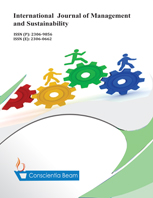How fear affects employees’ performance: A process model
DOI:
https://doi.org/10.18488/11.v12i1.3271Abstract
The effect of emotions on employees’ attitudes, motivation, and workplace behaviors is an important and central topic in organizational behavior research. Therefore, the main purpose of this study is to develop and empirically test a model that explains how fear affects employees’ performance. The model was tested on a sample of 177 nurses working in different Jordanian hospitals. A questionnaire was developed to measure the main constructs of this study. The data was analyzed in SPSS using simple regression to test the main direct hypotheses. The model hypothesizes that fear has a positive effect on two psychological states: emotional exhaustion and perceived stress. Moreover, it hypothesizes that these two states will affect employees’ career choice regret, which, in turn, negatively affects employees’ performance. The results provided statistical support for all the proposed hypotheses. We concluded that excessive fear provokes emotional exhaustion and stress in frontline employees and that these two psychological states contribute to the development of career choice regret, which eventually affects employees’ performance. The findings of this study may enable managers to gain deeper insight into and a better understanding of the process by which fear influences employee performance. Finally, limitations and directions for future research are discussed.

